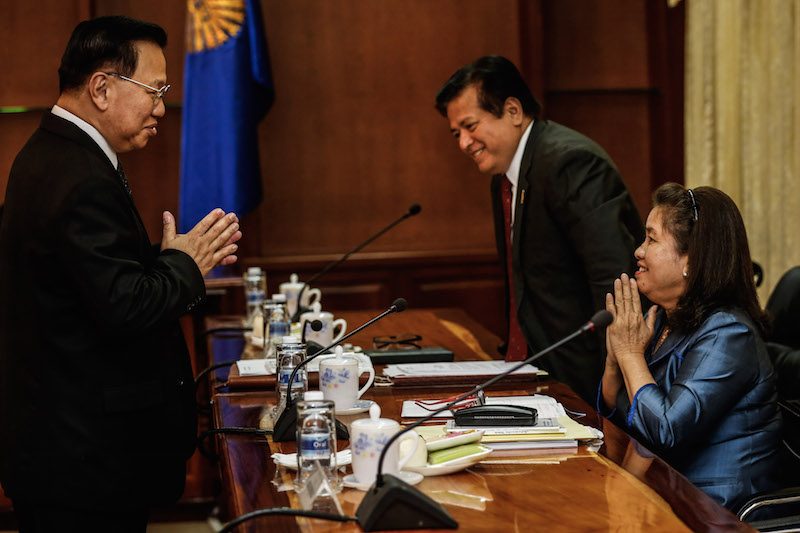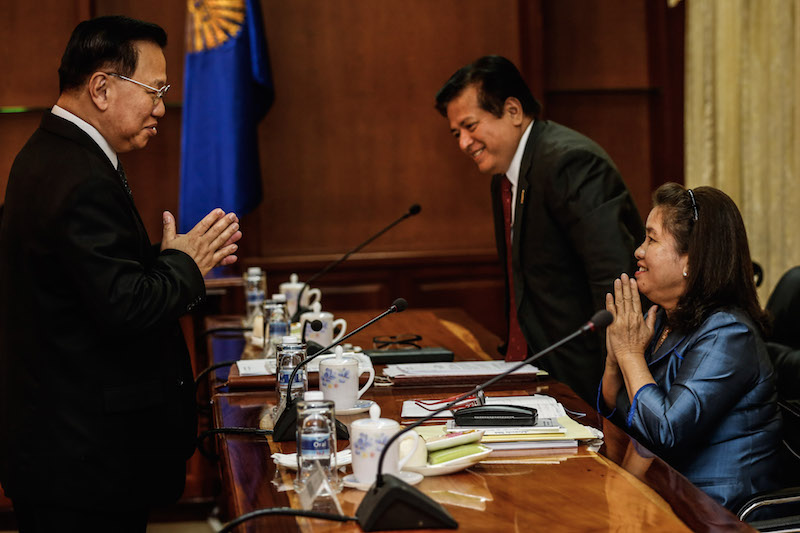Facing a barrage of what it says are politically motivated criminal cases, the opposition emerged from the sidelines of the political process on Wednesday to advance judicial reforms and protect the parliamentary immunity of two of its lawmakers in a meeting at the National Assembly.
The CNRP also indicated that party Vice President Kem Sokha would leave his self-imposed house arrest to register to vote in the next two months.

Since police attempted to arrest Mr. Sokha in May, he has been living inside the party’s Phnom Penh headquarters while his colleagues have mostly kept quiet, refusing to engage with the CPP in the National Assembly.
“We never announced a boycott,” CNRP spokesman Yem Ponhearith said on Wednesday, apparently backtracking on a May 27 announcement that legislators “could not fulfill their work at the National Assembly when lawmakers’ immunities have repeatedly been violated.”
One lawmaker, Um Sam An, is in prison over Facebook posts critical of the government, while Mr. Sokha was sentenced to five months in prison this month—both despite their constitutional immunity from prosecution.
The CNRP’s newfound participatory spirit comes on the heels of a speech last week by Prime Minister Hun Sen noting a “cease-fire” between the two parties, despite more than 20 opposition figures and human rights activists having been jailed in the past year.
In recent days, Mr. Sokha has urged the party to refrain from “rude words” that might inflame tensions and called on the ancestral spirits to inspire the country’s leaders to release political prisoners during the Pchum Ben religious holiday.
Assembly spokesman Leng Peng Long said that parliament’s standing committee had voted on Wednesday to consider an overhaul of a trio of laws passed in 2014 that critics say centralized the power of the Ministry of Justice over Cambodia’s prosecutors and judges, further politicizing a court system widely seen as corrupt.
“The permanent committee decided to send it to expert committee for review as requested by excellency Son Chhay,” Mr. Peng Long said, referring to the CNRP lawmaker who drafted the law. Once the committee on legislation and justice reviews the legislation, “we will bring the agenda to a plenary session” for debate and vote by all lawmakers, he said.
The standing committee also decided to deny a request by the Ministry of Justice for the full 123-seat Assembly to vote on whether to strip CNRP lawmakers Tok Vanchan and Pin Rotana of their parliamentary immunity, he said.
The Constitution only allows for the arrest of lawmakers if they are caught in the act of a crime—a threshold not met in the case of Mr. Vanchan and Mr. Rotana, Mr. Peng Long said.
Both lawmakers were swept up in a criminal case against Mr. Sokha, who was convicted earlier this month in relation to a “prostitution” case that also ensnared four officers from rights group Adhoc, an election official and a CNRP commune chief.
After Mr. Sokha was sentenced for refusing to appear in court, the opposition threatened mass demonstrations. In response, Mr. Hun Sen said such protests were banned and the military was deployed around the party’s headquarters in helicopters, speedboats and trucks.
Mr. Ponhearith, the CNRP spokesman, said on Wednesday that Mr. Sokha would leave his temporary home to register to vote—the deadline is November 29.
“According to the law, his excellency Kem Sokha still has full rights to registration of election,” Mr. Ponhearith said, adding that “we are not sure when it will happen.”
Y Rin, a municipal court spokesman, said Mr. Sokha would not face arrest until his appeals process was finished. “He will not be arrested until the verdict has been finalized,” Mr. Rin said on Wednesday.
Sam Sokong, an attorney on Mr. Sokha’s legal team, said on Wednesday that they planned on appealing at the end of Pchum Ben, leaving a window for Mr. Sokha to register without arrest.
Mr. Chhay, the CNRP lawmaker, reiterated Mr. Ponhearith’s claims that the party was not reversing any prior boycott and was instead selectively participating in areas where it could institute reforms.
“The problem is that we cannot go to parliament and allow the parliament to intimidate our acting president,” Mr. Chhay said. “But when it comes to reforming the country’s institutions such as the courts, we have to take the situation very seriously.”
The opposition still had to “wait and see” how the Assembly responded to its reform attempts before fully rejoining the body, he added. “We believe that if parliament conducts the way properly, we will take part in it.”
Opposition leader Sam Rainsy, who is living in France to avoid prison, has repeatedly said that the CNRP would only join full sessions of parliament if there was a “comprehensive solution to the current political crisis.”
Sophal Ear, an associate professor of diplomacy and world affairs at Occidental College in Los Angeles, said that the CNRP was hoping that “maybe, just maybe, the political tango can resume.”
“Of course, it’s a bit like being half-pregnant,” he wrote in an email of the party’s quasi-boycott. “No such thing. Either you’re in or you’re out.”




